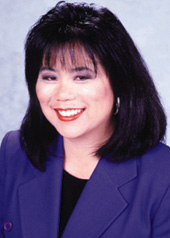GOLDSEA | ASIAMS.NET | ASIAN AMERICAN PERSONALITIES
ASIAN AMERICAN AIR FORCE
PAGE 11 OF 11
| "I've seen so many changes in this field the past five years alone that by the time he or she is old enough to enter a career it's going to be a completely different business." |
GS: Do Asian women have it better than Asian men in the field?
EY: I think so.
GS: Or is that simply true in the general population?
EY: No, I think in years past a lot of women felt the men got the big assignments.
GS: How do Asian women have an easier time than Asian men?
EY: They must because we see more of them.
GS: That's true.
EY: There are several factors involved. One is the visible role models. Someone like Connie Chung who is very visible can encourage a lot of Asian women to pursue the field. Whereas with a lack of a male counterpart, you naturally have fewer Asian men thinking of broadcast as a career possibility. That is changing. In terms of who comes in to interview and who applies for our different training programs Iıve seen a gradual increase in Asian men but it's still predominantly Asian women. Some people say that perhaps it's because in Asian culture men are steered not only toward traditional careers but careers where your income is assured. In TV when you start out you can make so little money, and it's also very hard to find a job.
GS: Do you see visible differences in the kind of women coming into the field now versus 15 years ago?
EY: I see a huge increase in the confidence level of young Asian people who come into the business. I do find some of them are more focused on the superficial aspects of the business, being on the air as opposed to the service you provide. It really is an intense job in terms of the amount of work involved and news judgement involved and so forth.
GS: What's your hobby?
EY: We travel a lot, see movies. Until I got married I was taking piano lessons.
GS: Are you good?
EY: I need to practice, but I really enjoy it.
GS: How did you meet your husband?
EY: I was a judge for a local design competition among San Francisco fashion designers and my husband [Ron Blatman] was director of business development for the city of San Francisco. We ended up seated at the same table and hit it off.
GS: He asked you out?
EY: Not quite. It was like, Let's have lunch sometime to talk about city issues.
GS: How long after did you get married?
EY: Within two years [in December 1993].

LINDA YEE started at KRON as a writer and producer after getting a journalism degree from SF State. She then worked four years at KGO before moving to KPIX. In 1980 she returned home to KRON where she has earned three Emmies for her reporting.
GS: Are you planning on having children?
EY: Yes.
GS: If your child wanted to go into this field, would you approve?
EY: I can't answer that. I've seen so many changes in this field the past five years alone that by the time he or she is old enough to enter a career itıs going to be a completely different business.
GS: In what respect?
EY: The communications field is changing. Even the role of anchorperson is not necessarily going to continue the way it has.
GS: What are you doing to stay in front of the pack?
EY: I probably should do more. I recently took on this new assignment of doing consumer reporter. That's going to keep me pretty absorbed.
RETURN TO PERSONALITIES
| PAGE 1 | 2 | 3 | 4 | 5 | 6 | 7 | 8 | 9 | 10 | 11 |
CONTACT US
|
ADVERTISING INFO
© 1996-2013 Asian Media Group Inc
No part of the contents of this site may be reproduced without prior written permission.
